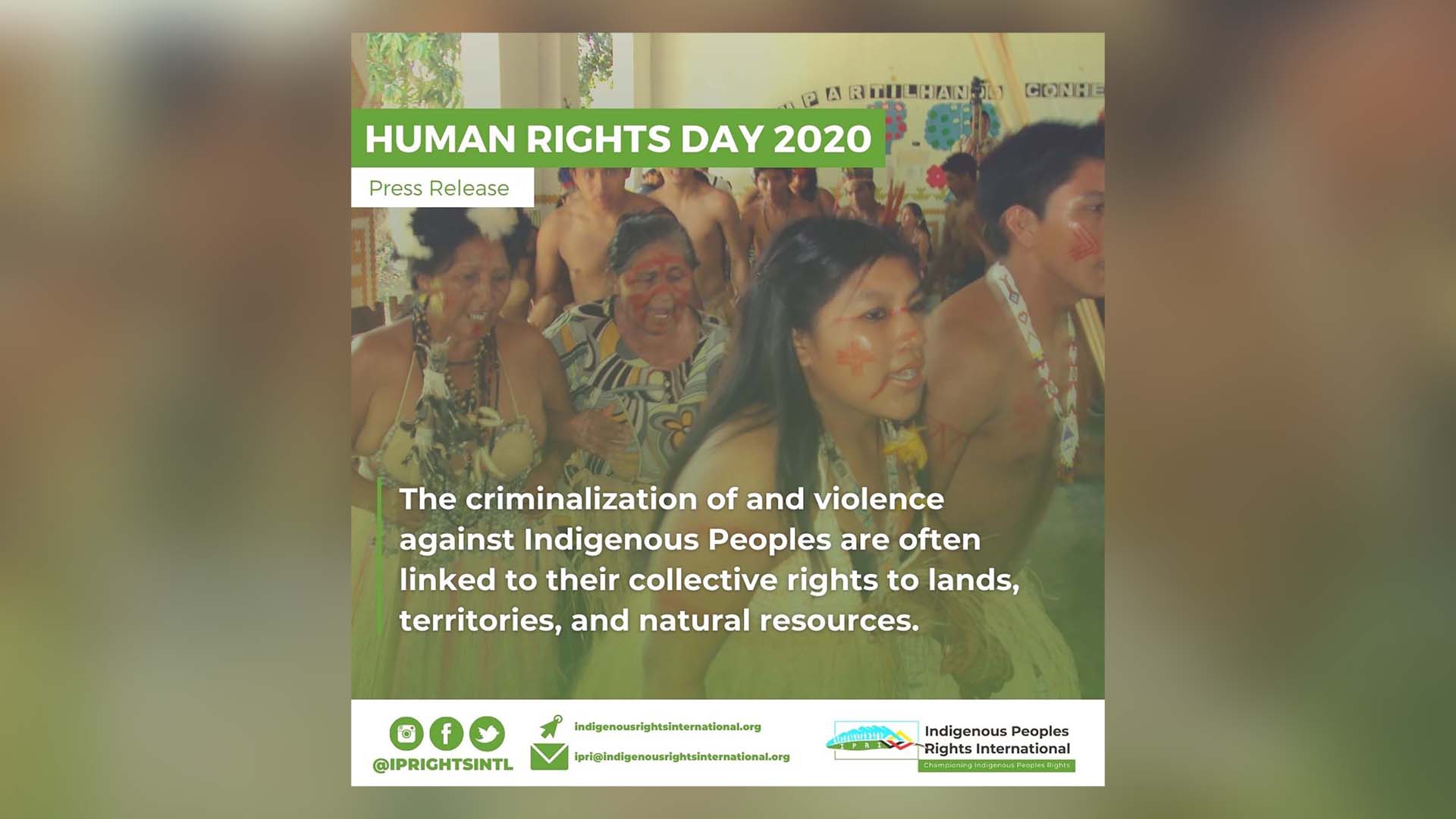In commemoration of the International Human Rights Day 2020, the Indigenous Peoples Rights International (IPRI), a global organization that champions Indigenous Peoples’ individual and collective rights, hosted the webinar “Living Under Threat: Responding to the collective impacts of the increasing violence against and criminalization of Indigenous Peoples” on December 9, 2020.
The webinar provided a space for its partner indigenous organizations and allies in Brazil, Colombia, Mexico and the Philippines to share the particularities of criminalization of and violence against Indigenous Peoples in these countries and to highlight the collective dimension of human rights violations against Indigenous Peoples.
It welcomed Sonia Guajajara of Articulação dos Povos Indígenas do Brasil/Association of Indigenous People of Brazil (APIB) of Brazil, Leonor Zalabata Torres of the Arhuaco people, Sierra Nevada in Colombia, Abel Barrera of Centro de Derechos Humanos de la Montaña-Tlachinollan of Mexico, and Mai Taqueban of Legal Rights and Natural Resources Center/Kasama sa Kalisakan (LRC-KSK) of the Philippines. IPRI co-director and former UN Special Rapporteur on the Rights of Indigenous Peoples, Victoria Tauli-Corpuz, moderated the event.
Sonia Guajajara’s discussion focused on violence and criminalization in Brazil’s regression on recognized rights. She elaborated on how Brazilian president Jair Bolsonaro has perpetuated systematic attacks against Indigenous Peoples.
In the context of Colombia, Leonor Zalabata shared the situation of Indigenous Peoples after the Peace Accords and the unceasing disregard of Indigenous Peoples’ self-determination, autonomy, and self-governance. She reflected on how the current hegemonic economic model undermines Indigenous Peoples’ way of life and how the Colombian government manipulates the law to weaken their autonomy and self-government.
Abel Barrera presented the strength of Indigenous Peoples in confronting Mexico’s old and new threats of unsustainable development.
Mai Taqueban elaborated on the criminalization of and violence against Indigenous Peoples within the current Philippine administration. The Philippines has seen further shrinking of its democratic space exemplified by the signing of Republic Act No. 11479 or The Anti-Terrorism Act of 2020.
In September 2018, Victoria Tauli-Corpuz, during her term as the Special Rapporteur, reported to the Human Rights Council the worsening of criminalization of indigenous human rights defenders. She reiterated the studies of “the Special Rapporteur on the situation of human rights defenders and the Special Rapporteur on human rights and the environment who have raised alerts over ‘a global crisis’ of attacks against environmental human rights defenders, highlighting that many of these defenders are members of indigenous communities.”
With the COVID-19 pandemic, the issue of criminalization of Indigenous Peoples has further escalated. In its mid-year report released in August, IPRI noted how governments have taken advantage of the pandemic to implement laws and policies that are more effective in curtailing fundamental freedoms than curbing the spread of COVID-19. It further highlighted the impending threats of several government economic recovery plans that heavily rely on exploitation of the environment and natural resources, which are mostly within the territories of Indigenous Peoples.
IPRI’s webinar series in line with the 9th UN Forum on Business and Human Rights held on 16 – 18 November further highlighted the issues of COVID-19 economic recovery plans. It raised the responsibilities of business corporations regarding human rights violations of Indigenous Peoples’ in areas where they operate.
Similar concerns were also reflected in many of the cases that IPRI have been supporting from Africa, the Artic, Asia and Latin America through its Legal Defense Fund and advocacy program. The cases also surfaced that a single case usually involves numerous incidents of human rights violations to Indigenous Peoples’ individual and collective rights. Furthermore, in cases that involve attacks to an indigenous human rights defender, the security of his/her entire Indigenous Peoples’ group or community has also been compromised.
The criminalization of and violence against Indigenous Peoples are often linked to their collective rights to lands, territories, and natural resources. The narratives of Indigenous Peoples’ struggle to defend their self-determination, autonomy, and self-government as well as their lands, territories, and natural resources from around the world have similarities. They have been the foundation of indigenous movements worldwide to come together and show solidarity to one another. But these similarities in struggles are happening in varying political contexts, which may be specific to the structures and processes of a particular State.
This was further elaborated on IPRI’s webinar for Human Rights Day 2020 as the speakers highlighted the specificities of their struggles in their respective national political context. IPRI hoped that recently concluded webinar further emphasized that Indigenous Peoples can only recover back better out of this pandemic and prevent a next one if all will stand with other Indigenous Peoples in protecting their rights to self-determination and to their land, territories, and resources.


%2020.49.20.png)
